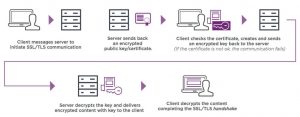What is an SSL Certificate?
SSL Certificates are small data files that digitally bind a cryptographic key to an organization’s details. When installed on a web server, it activates the padlock and the https protocol and allows secure connections from a web server to a browser. Typically, SSL is used to secure credit card transactions, data transfer and logins, and more recently is becoming the norm when securing browsing of social media sites.
SSL Certificates bind together:
- A domain name, server name or hostname.
- An organizational identity (i.e. company name) and location.
An organization needs to install the SSL Certificate onto its web server to initiate a secure session with browsers. Once a secure connection is established, all web traffic between the web server and the web browser will be secure.
When a certificate is successfully installed on your server, the application protocol (also known as HTTP) will change to HTTPS, where the ‘S’ stands for ‘secure’. Depending on the type of certificate you purchase and what browser you are surfing the internet on, a browser will show a padlock or green bar in the browser when you visit a website that has an SSL Certificate installed.
How does an SSL Certificate work?
SSL Certificates use something called public key cryptography.
This particular kind of cryptography harnesses the power of two keys which are long strings of randomly generated numbers. One is called a private key and one is called a public key. A public key is known to your server and available in the public domain. It can be used to encrypt any message. If ‘A’ is sending a message to ‘B’ she will lock it with ‘B’s public key but the only way it can be decrypted is to unlock it with ‘B’s private key. B is the only one who has his private key so B is the only one who can use this to unlock A’s message. If a hacker intercepts the message before B unlocks it, all they will get is a cryptographic code that they cannot break, even with the power of a computer.
If we look at this in terms of a website, the communication is happening between a website and a server. Your website and server are ‘A’ and ‘B’. Detail diagram is given below.

Why do you need an SSL Certificate?
SSL Certificates protect your sensitive information such as credit card information, usernames, passwords/PIN etc. It also:
- Keeps data secure between servers
- Increases your website Rankings
- Builds/Enhances customer trust
- Improves conversion rates
- Create safer experiences for your customers
- Increase security of your mobile and cloud apps
Types of SSL/TLS Certificates:
Extended Validation (EV), Organization Validated (OV) and Domain Validated (DV) certificates are widely used by organizations that want to provide their online customers with strong encryption technology and identity assurance. The increased vetting, particularly for EV, OV and DV certificates, are what makes these high assurance certificates more expensive.
Extended Validation (EV) Certificates:
EV certificates are preferred by most online users because they come with the most comprehensive verification checking, which includes domain verification as well as crosschecks that tie the entity to a specific physical location. EV certificates are distinguished with a locked padlock, organization name and sometimes the country ID in the web address bar in most major browsers.
Organization Validated (OV) Certificates:
OV certificates, in addition to domain ownership, the organization is validated and the certificate details can be viewed on most major web browsers, giving online users the opportunity to determine if the site they’re on is legitimate.
Domain Validated (DV) Certificates:
A website secured with a DV certificate offers only a locked padlock in address bar, but does not show organization details because they do not exist. These certificates validate domain ownership only, can be acquired anonymously, and do not tie a domain to a person, place or entity.
When should I get it?
Technically, you can start a blog or an ordinary website and no need it right away. But if you start a website and run purchases exclusively through Credit/Debit card, bKash or other cards in that case an SSL certificate is mandatory. When you’re considering using credit card information for online purchases, PCI (Payment card Industry) compliance requires that you have an SSL certificate. In the long run, we’d recommend that any business gets set up with an SSL certificate.
Where do you buy an SSL Certificate?
SSL Certificates need to be issued from a trusted Certificate Authority. Browsers, operating systems, and mobile devices maintain list of trusted CA root certificates.
The Root Certificate must be present on the end user’s machine in order for the Certificate to be trusted. If it is not trusted the browser will present untrusted error messages to the end user. In the case of e-commerce, such error messages result in immediate lack of confidence in the website and organizations risk losing confidence and business from the majority of consumers.
There are many companies who are known as trusted SSL Certificate Authorities. This is because browser and operating system vendors such as Microsoft, Mozilla, Opera, Blackberry, Java, etc., trust those companies as a legitimate Certificate Authority and that it can be relied on to issue trustworthy SSL Certificates. The more applications, devices and browsers the Certificate Authority embeds its Root into, the better “recognition” the SSL Certificate can provide.
Catalyst IT Solution is a trusted reseller of SSL Certificate in Bangladesh. We also integrate it with your website.